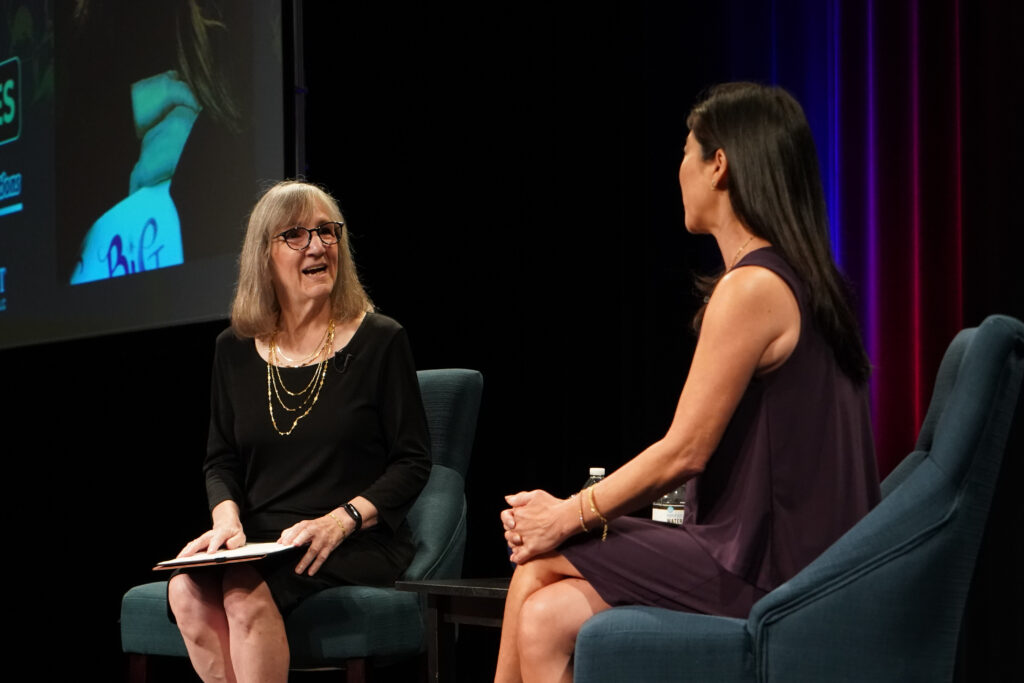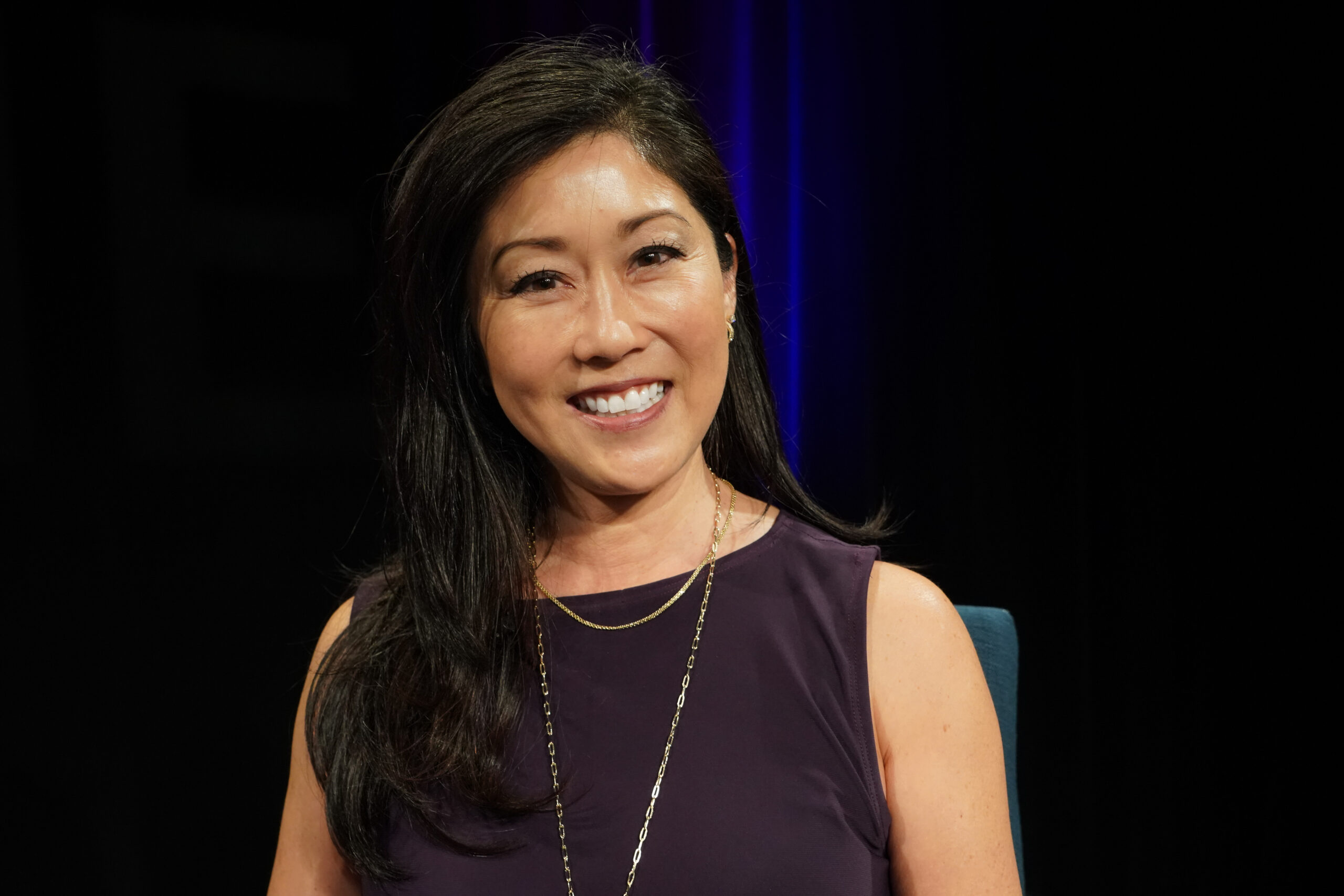The Abridged Version:
- Olympic Gold Medalist Kristi Yamaguchi visited PBS KVIE last month.
- Yamaguchi shared her experiences dealing with the pressure of being an Olympic athlete.
- Yamaguchi also discussed her nonprofit organization’s focus on childhood literacy.
As an Olympic Gold Medal winner, a two-time world champion and U.S. champion, with an 11-year professional career, and inspiring a celebrity Barbie Doll, it would be easy for figure skater Kristi Yamaguchi to rest on her laurels.
But that’s not how her parents raised her.
“Even when we were seven, eight, nine, they were like, ‘You can never rest on your laurels.’ And we were like, ‘What’s a laurel?”
“Now I get it. There’s always something more you can give.”
Yamaguchi visited PBS KVIE in August as part of the Sacramento station’s Studio Series. In my interview with her, she explained how competition and performance led her to her purpose as an educator and philanthropist.
Here are some highlights from our conversation in front of a live audience:

DONNA APIDONE: Is competitiveness something that’s nature or nurture?
KRISTI YAMAGUCHI: I think being a mom now and having two daughters (who are) very high-level competitive people, I think it’s innate. We couldn’t teach them. I think it’s just in you.
I always laugh because people are like, were you always competitive? I think so, because I remember as a kid on Easter, waiting at the door to go hunt Easter eggs and probably barreling past my brother and sister so I can collect the most eggs.
So I think there was always a little bit of competitiveness there. And then in certain situations, some of that is nurtured. For sure.
DA: What did you get out of working with a sports psychologist?
KY: In skating, the pressure is pretty high when you go out to compete, but once you’re at competition, it’s about 90% mental, 10% physical. You’re physically capable, you know that you’ve trained, and you can do what you’re about to perform. It’s about controlling your emotions and being able to perform at the highest level, even if you’re feeling a little nervous.
We used a lot of breathing techniques. We were taught visualization. Positive self-talk, where you’re constantly reinforcing the positive — “I can do this” — and pushing out the negative because you don’t want any of that creeping in while you’re in a performance.
DA: There is some point at which you go from competing to being a person of responsibility. People are looking to you for something, whether it’s something you say or how you appear in public, or how you carry yourself. When did that responsibility become clear to you?
KY: Probably pretty shortly after the Olympics. I remember doing certain interviews or media, and the words role model kept coming up, and at 20 years old, you were like, wait, what’s a role model? Like, what does that mean? Like, what do I have to do? And it’s intimidating, especially at 20 and having lived the sheltered life that I did as an athlete. But after a few years, you just realize, okay, all I can do is be myself and be as positive as possible.
There’s always the debate whether or not you can choose to be a role model. I don’t think you can. I mean, everyone’s a role model to someone. So you can only choose what kind of role model you’re going to be.
DA: Tell me about Always Dream.
KY: Always Dream is a nonprofit I founded back in 1996, so we’re coming up on our 30th anniversary. We’re all about early childhood literacy, with a strong bend towards family engagement. So, really, focused on our earliest readers — kids who are three, four, or five and six years old. We work through the classrooms — pre-K, TK (transitional kindergarten) and kindergarten classrooms — to reach these kids and their families.
What we do is really try to level that educational playing field by creating equity with resources. So providing high quality books that are age appropriate for the children, but then pairing it with family engagement support. We have book coaches who are assigned to the classrooms and the family members, who really give the outreach and the support to create that very literacy-rich environment at home.
So they set up consistent reading routines at home. It’s all about the family reading to their kids at home.
DA: It is very clear what it would do for the kids. What’s the feedback on what it does for other family members?
KY: Well, it’s very special time because it’s a time of connection with your child. You’re easily setting up a natural dialogue and connection with your child that you hopefully will continue on through their teenage years. But a lot of the family members are learning how to be that important educator at home for their kids.
It’s as simple as asking your child questions while they’re reading the book, looking at the pictures and explaining or let them explain what they see. And all of this is not only making connections in the child’s mind, but with the parent, and empowering them to really feel involved with their child’s learning at home, so that, as the years go along, they will continue to have that routine already set up.
This coming school year, we’ll be working with 39 different elementary schools — about 5,400 individuals in our program that we’ll be working with. This new school year, we will be expanding to the Sacramento area. We’re very excited. Hazel Strauch (Twin Rivers District) will be our first school here.
DA: Why did you decide to focus on literacy?
KY: We’ve always been about embracing the hopes and dreams of children and trying to inspire and provide the support that they needed. And when it came down to it, in order to reach a dream, it really starts with education. And being a pretty small organization, we didn’t really want to fix a problem in the high school, middle school age range, but rather create something for a child to start off their education on a solid foundation.
We slowly started to design our program with the mindset that everything starts with education. If you can’t read, you can’t become a scientist. You can’t become an athlete. It’s gonna be really hard to do any of those things.
Kristi Yamaguchi is the author of three books for young people with a goal of writing a fourth book in the next 18 months. She also wrote Figure Skating for Dummies.
Donna Apidone is a regular contributor, writing Coming of Age for Abridged.

